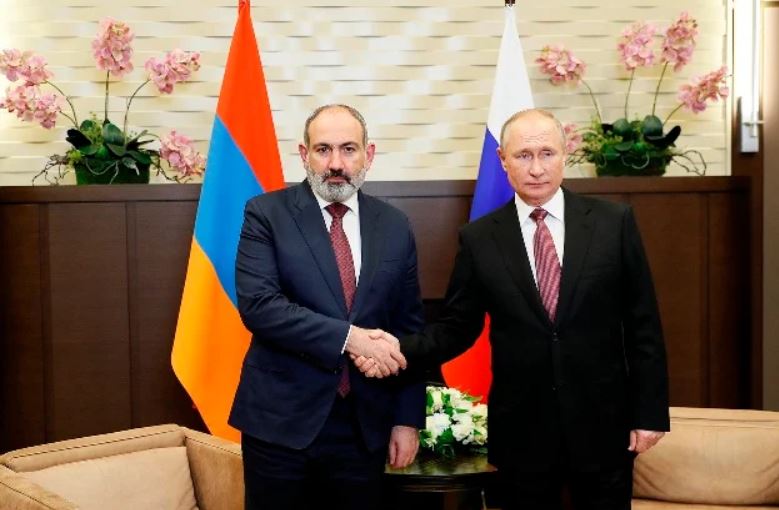Will Pashinyan sign a declaration on allied cooperation with Russia?
At the March 10 regular sitting of the Armenian government, Nikol Pashinyan noted that this year marks the 30th anniversary of the establishment of diplomatic relations with a number of countries, and in this connection to that, his visit to the Russian Federation is scheduled for April. “We are now in the preparatory stage of that visit, and we must do everything to make that visit also at a high level with rich content,” he said. On March 16, Pashinyan had a telephone conversation with Russian President Vladimir Putin, and they reported that they discussed issues related to the forthcoming official visit of the RA Prime Minister to Russia.
Diplomatic relations between the Republic of Armenia and the Russian Federation were established on April 3, 1992. More than 200 agreements have been signed between the two countries, including the August 29, 1997 Treaty on Friendship, Cooperation, and Mutual Assistance. The Declaration on Allied Cooperation between Russia and Armenia for the 21st Century adopted on September 26, 2000, reaffirmed the determination to deepen the friendship between the peoples of the two countries, the intense deepening of cooperation in all sectors, stable peace in the Caucasus region and the entire world, and stability through guaranteed security.
The agenda of Pashinyan’s official visit is not known. It cannot be ruled out that Pashinyan will sign a new declaration on allied cooperation with Russia during his upcoming visit. Russia is in such a situation today that Putin desperately needs to show the West how good an ally he is for partner countries.
Read also
Russia’s ambitions to strengthen its leadership and influence in the South Caucasus are manifested in deep cooperation with Azerbaijan, which was eventually resolved by the signing of the Declaration of Allied Relations. It is worth mentioning here the rather active activity and drive of Russia in the process of implementing the “3 + 3” gauge put forward by the President of Azerbaijan. On February 22, Putin and Aliyev signed a declaration on allied cooperation, which announced that a new stage in the development of bilateral relations was beginning.
Moscow and Baku agreed from now on to consider the possibility of providing military assistance to each other in order to ensure security and stability.
“In order to ensure security, peace and stability, the Russian Federation and the Republic of Azerbaijan may consider providing mutual military assistance on the basis of the UN Charter, individual international treaties, taking into account existing international law,” the Russian-Azerbaijani alliance declaration said. The first point of the 43-point Declaration stated that Russia and Azerbaijan are building their relations respecting each other’s territorial integrity.
In Article 11 of the Declaration, Russia and Azerbaijan resolutely suppress the activities of organizations and individuals in their territories, which are directed against the sovereignty, independence and territorial integrity of the other. And according to the 18th point of the declaration, Russia and Azerbaijan unite their efforts to counter-neutralize, in particular, in the fight against international terrorism, extremism and separatism. Shortly after Aliyev’s visit in February and the signing of a declaration of allied cooperation with Russia, Azerbaijan began to take provocative steps towards Artsakh. The people of Artsakh have been in a humanitarian crisis for several weeks, and this situation, as they say, is in the eyes of the Russian peacekeepers.
Some experts believe that since Moscow is busy with the war in Ukraine on the one hand, and the difficulties of relations with the West on the other, with the problems of Russia’s isolation, this situation is a good opportunity for Azerbaijan to create new problems for the Armenians of Artsakh and to get desirable concessions from Armenia.
Different hypotheses can, of course, be put forward. However, it is a fact that Russia, with its “neutrality” in the role of peacekeeper in Artsakh, cannot fulfill the allied obligations between Armenia and Azerbaijan in the way that both Armenians and Azeris expect from it. As a result, we have what we have, this is how Russia is today. It is difficult to understand Putin. Today, he seeks to bring the tension with the West to such an extent that Moscow is taken into account so that, as a superpower, its voice can be decisive on various issues.
Despite these ambitions, however, the Russian peacekeepers are unable, in fact, to put an end to the openly cynical and provocative steps of the Azerbaijani side in the issue of gas supply in small Artsakh. This is how Putin’s ambitious Russia is today. Or, in terms of Russia, in particular, nothing changes in the approaches. A quartet of a famous poem by the Russian poet Fyodor Tyutchev is always very relevant: “Russia cannot be understood with the mind alone. No ordinary yardstick can span her greatness: She stands alone, unique – In Russia, one can only believe” («Умом —Россию не понять, Аршином общим не измерить: У ней особенная стать — В Россию можно только верить»).
Emma GABRIELYAN




















































